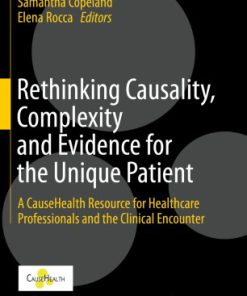The Value of Systems and Complexity Sciences for Healthcare 1st Edition by Joachin Sturmberg 9783319262192 331926219X
$50.00 Original price was: $50.00.$25.00Current price is: $25.00.
The Value of Systems and Complexity Sciences for Healthcare 1st Edition by Joachin Sturmberg – Ebook PDF Instant Download/Delivery:9783319262192,331926219X
Full dowload The Value of Systems and Complexity Sciences for Healthcare 1st Edition after payment

Product details:
ISBN 10:331926219X
ISBN 13:9783319262192
Author:Joachin Sturmberg
This visionary reframing of health and healthcare uses a complexity science approach to building healthcare systems that are accessible, effective, and prepared for change and challenges. Its holistic map for understanding the human organism emphasizes the interconnectedness of the individual’s physical, psychological, cognitive, and sociocultural functioning. Applications of this approach are described in primary, specialist, and emergency care and at the organizational and policy levels, from translating findings to practice, to problem solving and evaluation. In this model, the differences between disease and illness and treating illness and restoring health are not mere wordplay, but instead are robust concepts reflecting real-world issues and their solutions.Based on the Proceedings of the 1st International Conference of Systems and Complexity for Healthcare, topics covered Coping with complexity and insights from studying epidemiology in family medicine Anticipation in complex potential implications for improving safety and quality in healthcare Monitoring variability and complexity at the bedside Viewing mental health through the lens of complexity science Ethical complexities in systems what care and for whom? The value of systems and complexity thinking to enable change in adaptive healthcare organizations supported by informatics If the facts don’t fit the theory, change the implications for health system reform The Value of Systems and Complexity Sciences for Healthcare will interest and inspire health and disease researchers, health professionals, health care planners, health system financiers, health system administrators, health services administrators, health professional educators, and, last but not least, current and future patients.
The Value of Systems and Complexity Sciences for Healthcare 1st Table of contents:
Part I Complexity in Clinical Care
1 “Returning to Holism”: An Imperative for the Twenty-First Century
1.1 Models: Mental Representations of Reality
1.2 Distributions in Living Systems
1.3 Characteristics of CAS
1.4 Holism
1.5 Re-framing Health
1.5.1 Health as a Dynamic Entity
1.5.2 Health and Dis-ease as Experiential States
1.5.3 Operationalising Health as a Complex Adaptive State: The Somato-Psycho-Socio-Semiotic Model
1.5.4 Dynamics of Health
1.6 Health as the Organising Principle for a Twenty-First Century Health System
1.7 Implications for the Twenty-First Century
References
2 Systems Biology: Unravelling Molecular Complexity in Health and Disease
2.1 Introduction
2.2 Holism: An Imperative for the Twenty-First Century
2.2.1 Disease Complexity: Malfunction of Molecular Networks
2.2.2 Ethical Complexities in Systems Medicine
2.2.3 Improving Healthcare Through Complexity Science
2.3 Experimental Design for Systems Biology
2.4 Conclusions
References
3 Complicated vs. Complex, Disease vs. Illness: Rethinking Diagnosis, Therapy, and Restoring Health
3.1 Complex vs. Complicated Systems
3.2 The Primacy of Dynamic Patterns in Health and Illness
3.3 Disrupted Dynamic Patterns on the Pathway to Illness and Disease
3.4 Disease and Illness: Chicken or Egg?
3.5 The Complex Systems—Osteopathic Medicine Synergy: Treating Illness and Restoring Health
References
4 A System for Systems Epidemiology: The Example of Inference from Agent-Based Models
4.1 Systems and Epidemiology: The Conceptual Argument
4.2 Systems and Epidemiology: An Empirical Example
4.2.1 Model
4.2.2 Simulations
4.2.3 Findings
4.2.4 Implications
References
5 Coping with Complexity and Uncertainty: Insights from Studying Epidemiology in Family Medicine
5.1 Braun’s Law, Distribution, Grid and Protocols: An Implicit Handling of Epidemiological Complexit
5.1.1 Braun’s Law
5.1.2 Distribution
5.1.3 Grid
5.1.4 Protocols
5.2 Braun’s Work in Its Historical Context
5.3 Understanding Complexity in Clinical Practice
5.3.1 Fractality
5.3.2 The Linguistic Properties of the Braun’s Distribution and Their Practical Consequences
5.3.3 Uncertainty = Risk
5.3.4 Bayesian Heuristics Are Not the Answer to Managing Uncertainty/Risk in Primary Care
5.4 Coming to Terms with Uncertainty: The Challenge for the Future of Family Medicine
References
6 Anticipation in Complex Systems: Potential Implications for Improving Safety and Quality in Health
6.1 Simple and Complex Systems
6.2 Recursion
6.3 Anticipatory Systems
6.4 Most Complex Systems Are Also Anticipatory Systems
6.4.1 Failure Modes in Simple vs. Complex Systems
6.5 What Does Any of This Have to Do with Safety and Quality in Healthcare?
6.6 Conclusions and Implications
References
7 Extreme Variability is Typical Not Normal
7.1 Introduction
7.2 Two Different World Views
7.3 Medical Implications
7.4 Discussion and Conclusions
References
8 Monitoring Variability and Complexity at the Bedside
8.1 Uncertainty and Emergence
8.2 What is Variability?
8.3 Monitoring Multi-Organ Variability
8.4 Monitoring Variability and Sepsis
8.5 Monitoring Variability and Organ Failure
8.6 Monitoring Variability and Extubation
8.7 What is the Meaning of Altered Variability?
8.8 Meaning of Degree of Variability?
8.9 Meaning of Complexity of Variability?
8.10 Summary
Conflict of Interest
References
9 Heterogeneity Mediated System Complexity: The Ultimate Challenge for Studying Common and Complex D
9.1 Introduction
9.1.1 Re-evaluating the Biological Meaning of Heterogeneity
9.1.1.1 Genotype Heterogeneity Maintains the Phenotype Within a Dynamic Environment
9.1.1.2 Heterogeneity Provides Necessary Variation for Somatic Cell Evolution
9.1.1.3 Stress Induced Heterogeneity: The Evolutionary Trade-Off
9.1.2 How to Achieve the Multiple Levels of Genetic/Non-genetic Heterogeneity?
9.1.3 The Importance of Heterogeneity in Somatic Cell Evolution
9.2 Implications of Using Heterogeneity Mediated System Complexity to Understand Human Diseases
9.3 Conclusions
References
10 Multimorbidity: Through a Glass Darkly
10.1 What is Multimorbidity from a Clinico-Epidemiological Perspective?
10.1.1 The Centrality of Diagnosis and the Challenges it Brings
10.1.2 What Impact Does This Have on Practice?
10.2 The Emerging Paradigm of Systems Medicine
10.2.1 The Emerging Literature on Systems Medicine
10.2.2 The Emerging Literature on Biomarkers
10.3 An Integrative Model from a Complex Adaptive Health Systems Perspective
References
11 Viewing Mental Health Through the Lens of Complexity Science
11.1 Complexity Science in Mental Health
11.1.1 Dynamics and Mental Illness
11.1.2 Examining Mood Dynamics Among Primary Care Patients with Affective Disorders
11.1.2.1 Dynamic Patterns of Anxiety/Depression
11.1.2.2 Dynamic Co-variability of Anxiety and Depression
11.2 Imperative for Change
11.3 Conclusion
References
12 Quantitatively Demonstrating the Complex Nature of Intimate Partner Violence
12.1 Studying Partner Violence
12.2 IPV Dynamics and Predictions
12.3 Understanding IPV as a Complex Adaptive System: Outcomes
12.4 Imperative for Change
12.5 Future IPV Research
References
13 Depression: Not Just a Top–Down Phenomenon
13.1 Physiological Underpinnings
13.1.1 Neurotransmitter Imbalance
13.1.2 Disruption of Homoeostatic Hormones
13.1.3 Excessive Inflammation
13.1.4 Co-Morbidity
13.2 Psychosocial Environment
13.3 Predisposed to Depression?
13.4 Imperative for the Twenty-First Century
References
Part II Complexity and the Healthcare System Ethics, Organisation Policy, and Politics
14 Ethical Complexities in Systems Healthcare: What Care and for Whom?
References
15 Systematic Reviews: Beyond Cochrane to Complexity
15.1 Cochrane Reviews for Evaluating Health Interventions
15.2 Cochrane Reviews and Complex Interventions
15.3 Complex Interventions and Realist Reviews
15.4 Context and Transferability
15.5 The Complementarity of Cochrane Reviews and Realist Reviews
15.6 International Comparison and Realist Review
15.7 Conclusion
References
16 Agent-Based Modelling of Organizational Performance
16.1 Prior Investigations
16.2 The Current Model
16.3 Results
16.4 Discussion
References
17 Leading the Emergency Department as a Complex Adaptive System
17.1 Complex Adaptive System Concepts
17.2 The Emergency Department System
17.3 Applying Complex Adaptive Systems into the Emergency Department
17.4 Extending the Use of Complex Adaptive Systems Beyond the Emergency Department
References
18 The Value of Systems and Complexity Thinking to Enable Change in Adaptive Healthcare Organisation
18.1 The Problem
18.2 The Actors
18.3 The Argument
18.4 Research Strategy
18.5 Findings
18.5.1 Literature: An Overview of Complex Adaptive Systems
18.5.2 Clinical Governance
18.5.3 Electronic Health Records
18.5.4 Education: Through Shared Learning
18.6 Themed Results
18.7 Discussion
18.8 Conclusions
18.9 Impact and Imperatives
References
19 Using a Team Approach to Address Avoidable Emergency Department Utilization and Re-hospitalizatio
19.1 Introduction
19.2 ED Utilization
19.3 Avoidable Re-hospitalization
19.4 Reflections
19.5 Conclusion
References
20 Access to Primary Care: A Complex Adaptive Systems Lens on Acuity
20.1 Multiple Dimensions to Access
20.1.1 Patient Access Needs
20.1.2 Scheduling Studies
20.2 A Complex Adaptive Systems Lens
20.3 Imperatives for Change
References
21 “If the Facts Don’t Fit the Theory, Change the Theory”: Implications for Health System Reform
21.1 The Health Vortex: Conceptualising a Complex Adaptive Health System
21.1.1 The Role of “Core Values” and “Simple Rules”
21.1.2 “Fit for Purpose”
21.2 What Do the Facts Tell Us
21.3 If the Facts Don’t Fit the Theory, Change the Theory
People also search for The Value of Systems and Complexity Sciences for Healthcare 1st:
complexity systems theory
value of systems thinking
a value system could be defined as
systems theory and complexity science
a value system is
Tags:
Joachin Sturmberg,Systems,Complexity,Sciences,Healthcare
You may also like…
Education Studies & Teaching
Complexity Applications in Language and Communication Sciences Àngels Massip-Bonet
Politics & Philosophy - Anthropology
Business & Economics - Management & Leadership
Business & Economics - Management & Leadership












